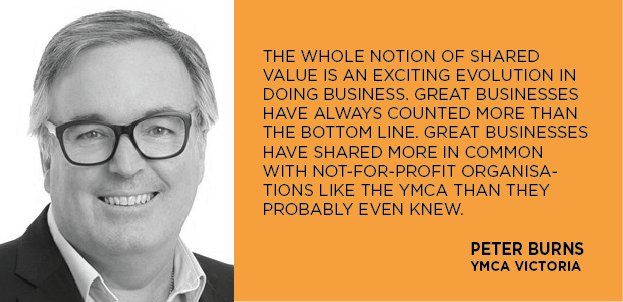In this month’s member interview series, we feature Peter Burns, Chief Executive, YMCA Victoria. Peter sheds light on how shared value is practised at YMCA, the opportunities it presents and his thoughts on how shared value can be used to further engage the next generation of business and community leaders.
What does shared value mean to you?
The whole notion of shared value is an exciting evolution in doing business. Great businesses have always counted more than the bottom line. Great businesses have shared more in common with not-for-profit organisations like the YMCA than they probably even knew. Now businesses can have a real impact on solving social issues as they deliver even greater shareholder value and garner “brownie points” from stakeholders, in particular, employees.
At the Y, we believe in the power of inspired young people. Millennials typically want to believe in what they’re doing. Great companies know this. They’re leveraging it, and having great impact.
What lead you individually to the shared value idea? How did you come across it?
I was introduced to The Shared Value Project in its formative stages. Rhod Ellis-Jones inspired me, or maybe cajoled me to join the earliest establishment meetings. To be honest at the start I thought, “what are these multinationals doing treading on the toes of not-for-profits like us!” It quickly became apparent to me that together we would do better. In those earliest of times, not for profits weren’t necessarily included in the conversations. Rhod saw beyond the possibilities raised in the original articles. He embraced the notion that for profits, not-for-profit and government needed to collaborate in order to yield the best results. Today it seems like it was never any different.
What does shared value success look like at YMCA and where are you at on the journey?
The value proposition of Shared Value for the YMCA is almost the complete reverse of Shared Value for listed companies. Companies typically look to improve the bottom line and solve a social issue. The YMCA typically solves social issues then looks to improve the bottom line.
The YMCA exists to inspire young people; to build strong children, families and communities; to solve social issues. What Shared Value has done for us is help us to place ourselves front and centre in solving social issues, while building a strong economic engine.
Childhood obesity, healthy eating, housing affordability, the voice of young people – these are the things that we work on; these are the things that if resolved, yield great value to our community.
Our collaborations yield the best Shared Value. For example work with one retail shopping centre owner where we have significantly diminished the number of incidents attributed to young people hanging around the centre, damaging property, and making people feel unsafe. In collaboration with the operator we offer diversionary activities, pathways to employment & training, and a social enterprise incubator. Incidents have dropped to almost zero. They couldn’t be happier, we couldn’t be happier. Shoppers are happy, young lives are transformed.
What is your role individually within YMCA to support the company along its shared value journey?
As the Chief Executive of YMCA Victoria, and past chair of the YMCA World Urban Network of YMCA CEOs, I have had the opportunity to promote shared value around the globe.
It’s taken some time, and a lot of conversations to “crack the nut”. For example, in North America my peers are used to seeking donations. It’s only when they see the impact and numbers attributable to shared value activities that they take an interest. Several have taken up the challenge to explore shared value.
On your website, you’ve been quoted as such: “The future of our world depends on the ideas, energy and voice of the group with the most to benefit; and the most to lose; young people. Everything else will follow.” How can shared value be used to influence the next generation of business and community leaders?
I routinely have at least one mentee and any point in the year. Most have been young entrepreneurs wanting to set up social enterprises. I contended that if more companies embrace the notion of shared value, these inspiring young people dedicated to “rocking the world” could find a home, and have an impact much greater than they can on their own in a small social enterprise.
So many young people look for meaning in their work. They want to know that the future is bright, abundant!
I’m not sure that the question you ask is the correct one. Maybe it should be, “how can the gent next generation of business and community leaders be leveraged to influence even more Shared Value initiatives?”
How has practicing shared value helped you individually in your role or career more generally?
I don’t think that practising shared value has helped me in any measurable way. My participation in the Shared Value Project certainly has though. The inspiration of participating in events, the networking, and the breathtaking audacity of some of the initiatives that I have discovered put fire in my belly. They inspire me to “keep on keeping on!”
What do you think are some of the pertinent issues in Australia that could be solved through creating shared value?
There are so many issues in Australia that could be solved through creating shared value, it merely takes some brainpower and application and we can spark new ideas. Among these are land affordability crisis, health, ageing population, climate change, water and food security.
